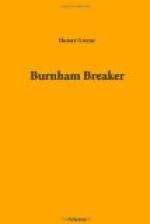“But I ain’t got that much money,” said Ralph, unstrapping his wallet.
“How much have ye got?” inquired the bar-tender.
“I’ve only got a dollar’n eighty-two cents.”
“Well, you see, sonny,” said Bummerton, “that ain’t more’n half enough. Ye shouldn’t order such a fancy dinner ’nless ye’ve got money to pay for it.”
“But I didn’t know it was goin’ to cost so much,” protested Ralph. “Uncle Billy an’ me got jest as good a dinner last Fourth o’ July at a place in Scranton, an’ it didn’t cost both of us but seventy cents. Besides, I don’t b’lieve—”
“Look here, Bummerton!” said Joe, rising and leading the bar-tender aside. They whispered together for a few moments and then returned.
“It’s all right,” said Joe. “You’re to pay him what money you have, and he’s to charge the remainder on my bill. I’ll stand the rest of it for you.
“I’ll be that precious ‘friend
in need,’
Who proves himself a friend indeed.”
“Then,” said Ralph, “I won’t have any money left to pay my fare back home.”
“Oh, I’ll see to that!” exclaimed Joe. “I invited you to ride up with me, didn’t I? and of course I’ll pay your fare; das verstekt sich; that goes without saying.
“I’ll never desert you, oh,
never! he spake,
We’ll stand by each other, asleep
or awake.”
It was not without much misgiving that Ralph gave the dollar and eighty-two cents to the bar-tender, and returned the empty wallet to his pocket. But Rhyming Joe soon engaged him again in conversation. The young man seemed to be deeply interested in the movement to restore the boy to his family rights and possessions. He asked many questions about it, about Craft, about Sharpman, about Ralph’s knowledge of himself; the whole ground, indeed, was gone over carefully from the beginning to the present; even the probabilities of the future were fully discussed.
In the meantime, the liquor in the bottle was steadily diminishing in quantity, as a result of Rhyming Joe’s constant attention to it, and Ralph thought he began to detect evidences of intoxication in the speech and conduct of his friend. His nose appeared to be getting redder, his eyelids were drooping, he was sinking lower into his chair, his utterance was growing thick, and his voice had a sleepy tone.
Ralph, too, felt sleepy. The excitement and exercise of the morning, the hearty dinner, the warm, close room, and the fumes of alcohol in the atmosphere, were all having their effect on his senses. He saw, dimly, that Joe’s chin was resting on his breast and that his eyes were closed; he heard him mutter in a voice that seemed to come from some distant room:—
“Of all ’e bowls I s-s-smell
or see,
The wassail bowl’s ’e bowl
f-f-for me,”
and the next moment both man and boy were fast asleep.




